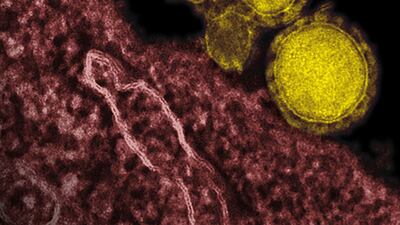ABU DHABI // More must be done to stop the spread of the deadly Mers coronavirus, the World Health Organisation has warned.
Countries must strengthen their surveillance, increase awareness and try to find out how people are infected, the WHO’s emergency committee said on Wednesday.
The call comes after a Mers-infected Jordanian mother in Abu Dhabi died shortly after giving birth to a daughter.
Her husband and eight-year-old son, also infected, are still being treated in hospital, while the newborn is being monitored.
But Mers-CoV is not yet considered an international public health emergency.
“After discussion and deliberation on the information provided, the committee concluded that it saw no reason to change its previous advice to the director general,” the WHO said.
The 15-member committee, which includes the deputy health minister of Saudi Arabia, Ziad Memish, said the situation continued to be of concern, in view of new cases and of information about the presence of the virus in camels in Qatar last month.
It called for more support for countries that are particularly vulnerable, such as Saudi Arabia – where most of the cases have been confirmed – and urged for more studies to investigate exactly how people become infected with Mers-CoV.
The organisation also reminded healthcare facilities of the importance of systematic implementation of infection prevention and control. Member states have also been reminded to notify the WHO of any new Mers-CoV infections, along with information about potential exposures.
The committee commended Saudi Arabia for its public health preparation, surveillance and management of the Haj. About 1.5 million pilgrims from 188 countries visited the country in October, raising fears about a possible epidemic of the virus.
Meanwhile, the Health Authority Abu Dhabi said it was coordinating closely with the Ministry of Health and other authorities following the latest cases in the emirate.
The father, 38, and son are said to be in a stable condition, but the health authority confirmed this week that all classmates and teachers of the Abu Dhabi pupil were to be tested for Mers-CoV.
The WHO confirmed that, unlike many other Mers cases, the mother, father and son had no travel history, no contact with a known confirmed case and no history of contact with animals.
In addition to members of the emergency committee, two expert advisers and a number of affected state parties reporting recent cases of MERS-CoV – including Saudi Arabia, Kuwait, Oman, Qatar and Spain – also spoke at the meeting.
The emergency committee has now met for a fourth time about Mers.
Scientists still do not know where it came from or how it is spreading.
Mers-CoV has infected 163 people and killed 70, predominately in Saudi Arabia.
The next meeting is scheduled for March.
jbell@thenational.ae

